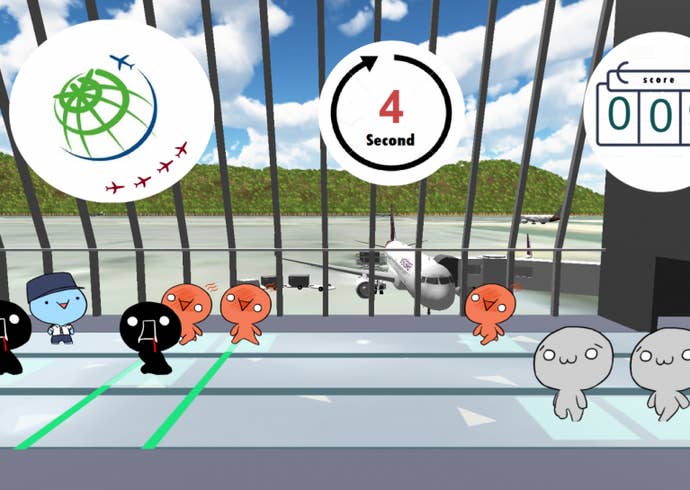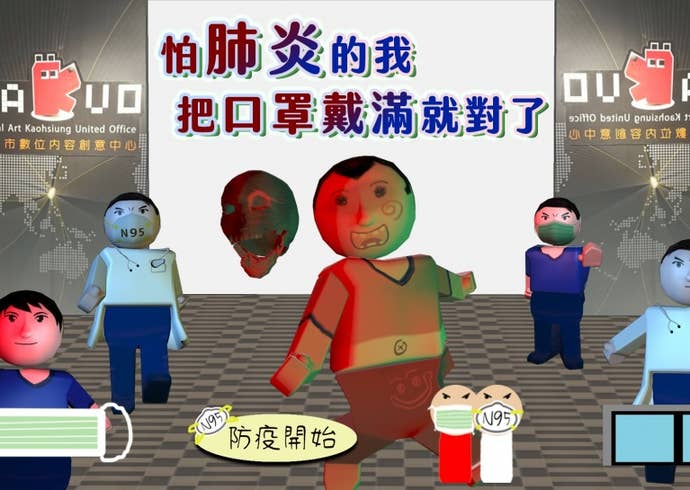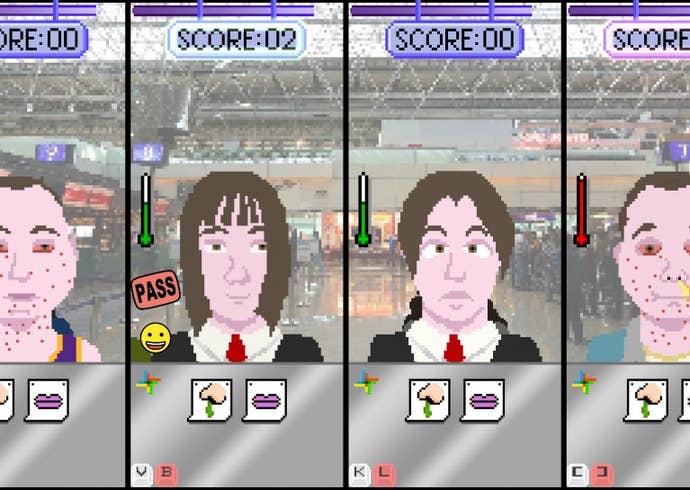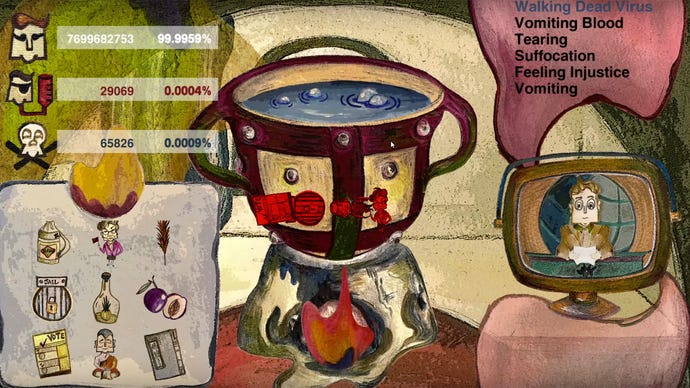How Asia's Global Game Jam Developers Are Exploring the Coronavirus Outbreak Through Games
From tower defense games to resource management sims, these games capture the anxiety around the coronavirus outbreak.
This article first appeared on USgamer, a partner publication of VG247. Some content, such as this article, has been migrated to VG247 for posterity after USgamer's closure - but it has not been edited or further vetted by the VG247 team.
From cancellations of live music shows in China to overcrowded public hospitals in Hong Kong, the novel coronavirus, or COVID-19, has heavily disrupted daily life in Asia. Face masks, hand sanitizer, and, for some reason, toilet paper have been sold out across pharmacies and retail outlets in many countries as fear of the virus has turned once-bustling cities into ghost towns. Lives have been put on hold, with more people staying indoors, and several businesses and schools have temporarily shuttered due to concerns around the epidemic.
Likewise, local game developers are no stranger to such scenes, with game development and community events taking a toll from the outbreak. Take for instance the annual Global Game Jam (GGJ), the world's largest game jam that took place internationally across 118 countries this year between Jan. 31 to Feb. 2. Like a hackathon for game development, teams are tasked to create a game under 48 hours under a specific theme.
In some countries, developers gather at physical game jam sites to work on these games together. In the China, Hong Kong and Taiwan legs of the event this year, however, nationwide quarantines took precedence, and precautionary measures were rife even where gatherings were cautiously permitted. While the Taiwanese leg of GGJ continued without a hitch at the jam sites in Taipei, Taichung and Kaohsiung, the events in both Hong Kong and China were conducted virtually.
"To be honest, it is very difficult to develop the game online. The most challenging thing is communication. We could just use Skype to communicate, [but] to compare with developing a game in a place together, we could not help each other directly and sometimes we misunderstood [each] others' ideas," Kelly Hiu, part of the team behind Bacterial World, a game submitted for GGJ Hong Kong, tells me. Bacterial World is one of many coronavirus-themed submissions, where teams are challenged to make games around the theme of "repair." While some interpreted that in various ways from home repairs to climate change, others have chosen to make games based on their experiences with the coronavirus.
That's how one Taiwanese team came up with their tower defense game called Fire God Mountain Hospital. Named after the makeshift field hospital in China that was quickly constructed in six days in response to the outbreak, the game lets players set up three types of towers, each dispensing medical resources like masks, syringes and sanitizers, to stem the tide of visibly-ill patients streaming out of the building. "Actually, [as] we are the country closest to China, I think everyone hopes the epidemic could be 'repair,'" says one member of the team. "Everyone in Taiwan are worry [sic] about themselves [being] infected. Masks, rubbing alcohol were sold out during the Lunar New Year. Everybody [is wearing] masks indoors or [when taking] transportation."
The game cannot be won, which mirrors the state of anxiety around the coronavirus. For instance, one type of patient cannot be healed or prevented from exiting the building. It ends when this group of patients eventually leave the hospital, flashing a somber-looking screen that announces the globe's inevitable doomsday.
"When the game was finished, [it's] also the day [the] Fire God Mountain hospital was finished. When we developed the game there's no vaccine for the COVID-19. Putting the vaccine setting into the game's material was kind of like a wish. Wishing there would be a vaccine in the future," says the team. "A few weeks later, we heard about the news of the vaccine. That gave everyone hope. Although the ending of the game isn't good, we still have [the] chance to repair our world. [We] hope the governments of the world work together and change this situation."

Such sentiments are a reflection of what many Taiwanese constantly worry about. Perhaps because these precautions around keeping the coronavirus at bay are constantly enacted, many teams center their games around enforcing these measures and the importance of personal hygiene. "People in Taiwan are [living] in the fear of being infected, because most of the Taiwanese don't believe that China government can stop the virus spreading, and everyone who joins the jam [must be] wearing [a] mask," says the Fire God Mountain Hospital team.
This distrust isn't unfounded. After all, authorities in Beijing initially covered up the outbreak of a severe acute respiratory syndrome in 2002, which left the region similarly scarred. Not only did this saddle many Taiwanese with a pressing need to practice respiratory hygiene at all times, it also made them a lot more conscious of the severity of the virus, and a drive to bring more awareness to the issue through making enjoyable games.
One game that reflects this desire to bring awareness is ??????? (Repairing Those Who Need Repairing), which has you play as an immigration officer who has to regulate a stream of passengers as they board a plane, while preventing folks who are clearly under the weather from boarding as well. With each round only pegged at 20 seconds, the game is a twitchy, rapid-fire frenzy on stemming the spread of the coronavirus disease.
"Although the manner in which the quarantine officer stops people who don't cooperate with the preventive measures is a tad exaggerated, we just wanted to keep the game fun and not stigmatize those who have symptoms of pneumonia during this sensitive period," says Afrien Tsai, the team's programmer. "What's important is to highlight the difficulties of quarantine work, and to call on everyone to cooperate with the appropriate measures."
Another game, ?????????????? (Put On A Mask If You're Afraid Of The Coronavirus), tasks players to mask up waves of attendees for a local convention by sniping at them through crosshairs. "We hope that through this game, everyone would understand the severity of the epidemic, and be more considerate of the efforts by frontline workers," shares Chenghan Ye, the team's programmer.

Then there's ??20? (20 Seconds At The Frontline), another submission about working as an immigration officer. "Taiwan attaches great importance to the epidemic, so we're constantly thinking about it," says Tailin Zhong, who worked on programming and art for the game. "We felt that we had to think of something special since the virus problem was very serious, so we decided to take into consideration current affairs and choose the theme of 'repairing the frontline against the epidemic prevention.'"
Competing with up to three other players, you'll have to inspect passengers for any symptoms of the infection in three short rounds. These symptoms differ every round—it could be an unnaturally low body temperature or blood-shot eyes—and the player who processes the most number of passengers correctly wins the game.
For the Hong Kong jammers, their games tend to carry an overt tinge of political rhetoric, given the ongoing Hong Kong protests over the highly unpopular extradition bill. Coupled with the same weariness and mistrust that the Taiwanese jammers have with China, these games are often marked by a sense of frustration over the way the country is handling the outbreak.
Some of these sentiments are also directed toward its own government for not doing enough to ward off the virus. Hong Kong's Chief Executive, Carrie Lam, vehemently refused to close their borders to China, which many felt may have encouraged the spread of the coronavirus. One such entry is Homeland, where players defend a fictional kingdom against a virus known as 2020-oVnC—one that incidentally resembles the symbol of the Chinese Communist Party—by managing the resources that will be invested to training medical staff, building fortified gates and funding the army.
Another Hong Kong submission is Vaccine Master, which lets players create vaccines for a variety of illnesses, from pneumonia to even cultural ills—one such example is the "gold digger illness." Players will need to mix several bizarre ingredients, including honey, ginger tea, and even a portrait of Lam herself, in the right order and quantity to produce the right concoction. "This year's theme [of] repair triggers what is on all of our minds. The fact that we feel disappointed and helpless against a totalitarian government is everywhere in our lives and for us, it is only a small slice of relief to be able to address the concerns through game making to remind us what we are going through today," says Isabella Ng, the team's artist.

In contrast to Taiwanese and Hong Kong entries, the coronavirus games by Chinese teams are typically centered around managing the spread of the virus and recovery, rather than criticism directed toward the Chinese government's conduct over the issue. This isn't surprising, given that self-censorship is rife in the country and critiques against the government can come with hefty consequences. "Coronavirus [has] become a really big deal around that day, and everyone is talking about Death Stranding or Plague Inc., so we kind of like to follow [what's] trending," says the team who made Immune, a game about defending the body against viruses and stopping the spread of infectious cells.
As the mayor of a small town called Hanwu, another entry, Anti-nCOV Simulator, gets players to manage the outbreak while keeping the general population calm. "The idea came about because of the coronavirus outbreak in Wuhan, China. We want [it] to be a game under the outbreak, under the command of the government, [and for players] to formulate policies, and then to overcome the disease and restore (and repair) peace in the town," says the team.
If the game simulates what it's like to live in a small town inflicted by the virus, then it surely also replicates the panic over the coronavirus. Random events, such as news about the rising number of coronavirus cases, the closure of schools and businesses, and instances of people hoarding will frequently flash on screen, inevitably sending the player into a state of sheer panic.
The outbreak may be widespread, but it definitely hasn't hampered the enthusiasm and passion of these game makers—some of whom are students who are looking to develop more games of their own, and others who are full-time developers who have temporarily formed teams to participate in GGJ. The Vaccine Master team, for instance, is planning to flesh out what they have created at GGJ into a full-fledged game which, in their own words, will "encapsulate our voices through the gameplay."
On the other hand, because many of the teams are temporary, most of them aren't planning to expand their submissions at the moment, unless they see a demand. "We still have a lot of bugs in the game, plus we are a temporary team, and this is a one-off game. The story is incomplete, so it is difficult to flesh it out," says one developer who worked on Put On A Mask If You're Afraid Of The Coronavirus.
"I'd love to," says the Immune team's sound designer, who only gave her name as SSZ. "[Our] original design is more interesting and we only made the basic part [for GGJ], but I don't have any method to do it. All the team members have full-time jobs in nice game companies. GGJ [has brought] us together to have this adventure, but without further goals we can't keep this small project [going]."
Even as the countries in the region continue to report growing cases of infections, these game developers still believe in the power of games to inform, entertain and even offer relief in these trying times. "We hope that people will have fun playing this game. This is our original intention behind making games. It would be even better if we could further emphasize the importance of epidemic prevention because of the theme," says the 20 Seconds At The Frontline team.
"We sure believe that game making, as any other art form, is a personal extension of the creators," Ng from the Vaccine Master team tells me. "And games can be entertaining, innovating, inspiring, or something deeply personal that capsule a time, or an event, or an unrealized ideas in our lives."



